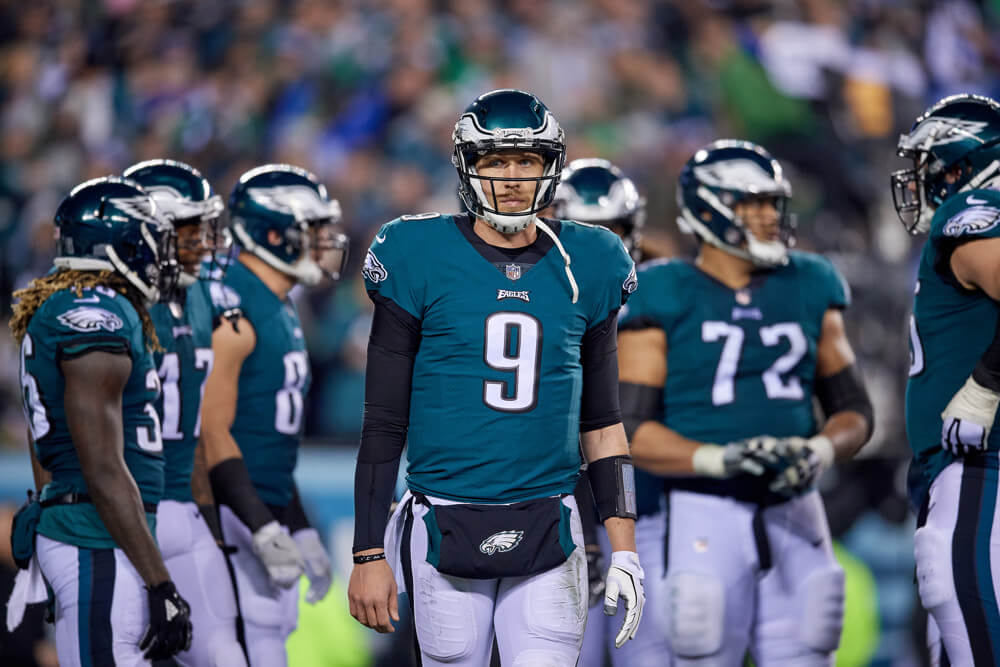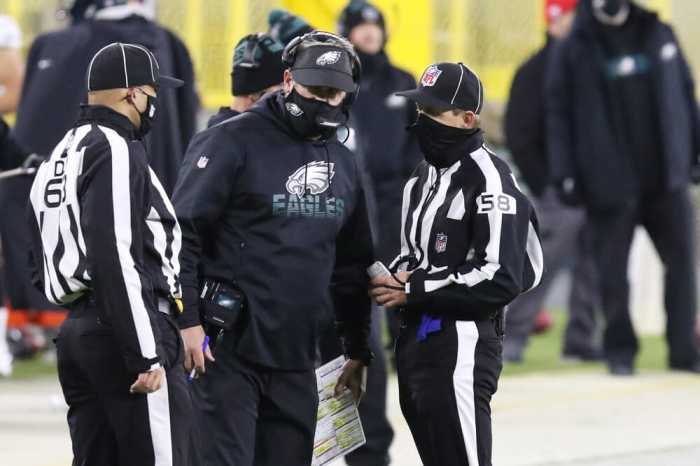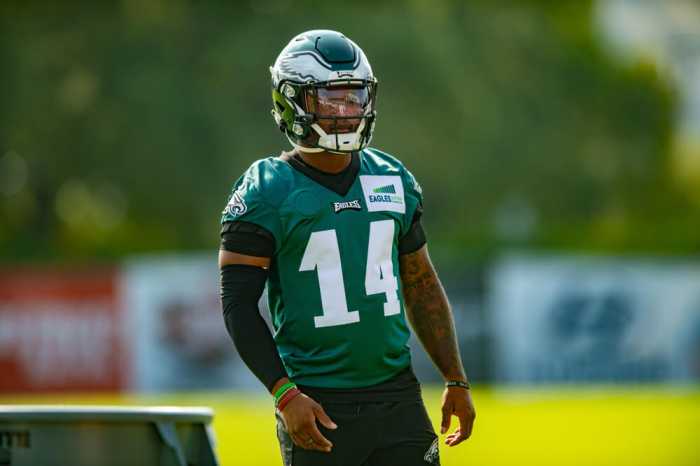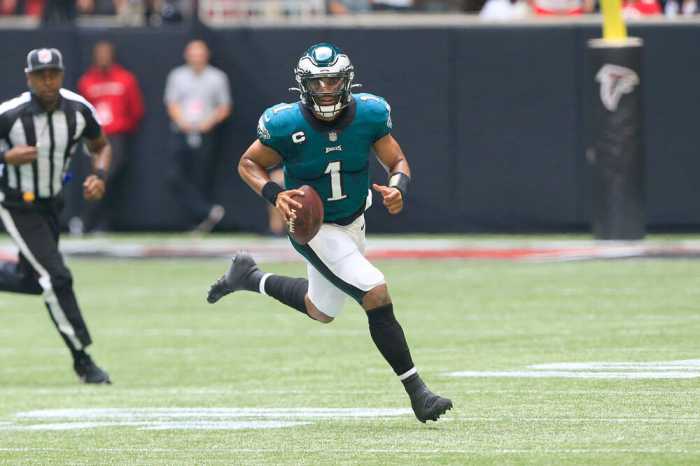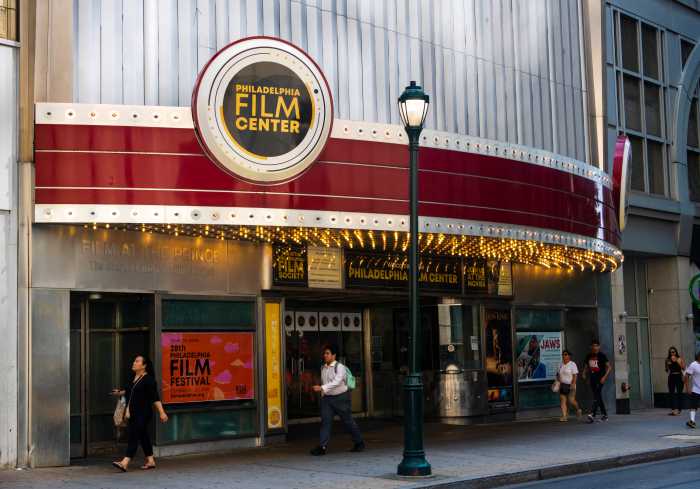The Philadelphia Eagles have advanced to the NFC Championship Game for the eighth time in franchise history and the seventh time during the 21st century.
The ghosts of the early 2000s no longer dominate the minds of Eagles fans. Simply mentioning the NFC Championship Game in conversation used to lead to criticism of the Eagles. However, this year’s Divisional Round victory moved them ahead of the Green Bay Packers as the NFC team with the most conference championship appearances in the new millennium. The New England Patriots are the only NFL team that’s appeared in more.
Jan. 18, 1981: Eagles 20, Cowboys 7
The Dallas Cowboys advanced to five Super Bowls during the 1970s at the height of the careers of general manager Tex Schramm, head coach Tom Landry, and quarterback Roger Staubach. The Eagles became the little brothers of the newly-formed NFC East with very little to brag about before Dick Vermeil came to Philadelphia in 1976.
The first-time head coach took some time to implement his system and build a beaten-down franchise into a winner. The Eagles earned their first playoff berth since the 1960 NFL Championship Game in Vermeil’s third season in 1978. They took another step forward with a playoff win in 1979.
A generation of Philadelphians got what they waited for when the Eagles took down “America’s Team” in the NFC Championship Game at Veterans Stadium after the 1980 season.
Wilbert Montgomery carried the ball 26 times for 194 yards, including the 42-yard run that sent the Vet into oblivion. A dominant ground game racked up 263 yards to cover for a rough day from signal-caller Ron Jaworski, who finished 9/29 for 91 yards and two interceptions.
An emotional day gave the Eagles their first-ever Super Bowl appearance and solidified the greatest year in Philadelphia sports history with all four major sports reaching the final round of their respective leagues.
The Eagles fell to the Oakland Raiders at the Superdome in New Orleans in Super Bowl XV after Jaworski was picked off three more times in a 27-10 loss.
Jan. 27, 2002: Rams 29, Eagles 24
Andy Reid followed in Vermeil’s footsteps with gradual steps forward as a first-time head coach after he took over the Eagles in 1999. He turned a 3-13 team into a more respectable 5-11 team in his first season and catapulted them to a playoff win after the 2000 season.
The Eagles took the next step in 2001 as NFC East champions at 11-5. They steamrolled the Tampa Bay Buccaneers on Wild Card Weekend and kept the momentum going with an upset victory over the second-seeded Chicago Bears at Soldier Field in the NFC Divisional Round.
A 14-2 freight train favored by 11 points awaited them in St. Louis for the NFC Championship Game. “The Greatest Show on Turf” had won the Super Bowl two years prior under an aging Vermeil.
Mike Martz had the dynamic offense back at their peak after the 2001 season. NFL MVP Kurt Warner had an arsenal of weapons led by Offensive Player of the Year Marshall Faulk and stud wide receivers Isaac Bruce and Torry Holt.
Donovan McNabb and an up-and-coming Eagles team proved they belonged when they took a 17-13 lead into the locker room at halftime after a touchdown pass to Todd Pinkston in the final minute.
The Rams got to work in the second half with 16 consecutive points. Faulk gashed the Eagles for 159 yards on the ground and helped build a 29-17 lead late in the fourth quarter.
The Eagles didn’t plan on going down easily. A late touchdown and a timely defensive stop got them in position for a potential game-winning drive. Faced with a critical fourth down, McNabb threw an interception to eventual Hall of Famer Aeneas Williams that all but sealed the deal.
McNabb and the Eagles left the field in St. Louis with their heads held high. They had hung tough until the final whistle with the Super Bowl favorites, and Reid had turned them into a legitimate championship contender entering the 2002 season.
Jan. 19, 2003: Buccaneers 27, Eagles 10
Reid and McNabb’s climb included playoff victories in consecutive seasons over the Tony Dungy-led Tampa Bay Buccaneers, a franchise that notoriously struggled in road playoff games, especially in cold weather.
The city of Philadelphia reached the height of Eagles hysteria surrounding the opportunity to clinch a Super Bowl berth against the Bucs in the NFC Championship Game after the 2002 season. The narrative seemed to play perfectly for the final Eagles game at Veterans Stadium, the quintessential home for a fan base regularly galvanized by a rough and tough mentality on the field and in the stands. A memorable day in franchise history was imminent after the Eagles took a 7-0 lead in the opening minute.
The Bucs, who replaced Dungy with the fiery Jon Gruden as head coach for the 2002 season, stifled the Eagles offense for the remaining 59 minutes en route to a 27-10 victory.
The nightmare scenario for Philadelphia began late in the 1st quarter when Tampa Bay wide receiver Joe Jurevicius took a short reception on a crossing pattern for 71 yards to set up a Bucs touchdown and quiet the raucous crowd at the Vet. The Bucs kept the momentum throughout the second half and took a 20-10 lead into the final minutes.
A late drive inspired hope for Eagles fans, only to end in the most stunning play in Philadelphia sports history. On first-and-goal from the Tampa Bay 10-yard line with just over three minutes remaining, cornerback Ronde Barber intercepted McNabb and iced the game with an ensuing 92-yard touchdown return. McNabb, after his third turnover of the game, couldn’t muster up much of an effort to chase down the streaking Barber.
As the story goes, you could hear a pin drop in the Veterans Stadium corridors as over 66,000 fans emptied out knowing their team had inexcusably looked past its opponent too soon.
The franchise’s two Super Bowl losses after the 1980 and 2004 seasons were more consequential from an outsider’s perspective. However, this was the most devastating loss Philadelphia ever witnessed.
Jan. 18, 2004: Panthers 14, Eagles 3
The Eagles limped out of the gates with an embarrassing loss in a rematch against the Bucs to open Lincoln Financial Field in 2003. They fell to 0-2 and 2-3 before reeling off nine consecutive victories to get in position to clinch the top seed in the NFC at 12-4.
A miracle play (and a generous ball spot) on 4th & 26 against the Green Bay Packers in the Divisional Round put the Eagles back in the NFC Championship Game for the third consecutive season in a third different building.
The Carolina Panthers came off an upset win over the Rams in St. Louis with undrafted quarterback Jake Delhomme under center.
The Philadelphia fans seemed to have learned a lesson about looking past an opponent, but that didn’t mean the team looked any sharper on their third try. Stephen Davis and DeShaun Foster controlled the game on the ground against a run defense that was never a strength of the Andy Reid era under Jim Johnson. Carolina threw only 14 times, but the punishing running style against helpless defenders took the pressure off Delhomme.
With critical offensive weapon Brian Westbrook out for the season, Panthers defensive back Ricky Manning Jr. pushed James Thrash and Todd Pinkston around all afternoon. He picked off McNabb three times before the swarming Carolina defense knocked the Pro Bowl quarterback out of the game. Koy Detmer threw a fourth interception, and the Eagles sputtered again in unthinkable fashion.
Jan. 23, 2005: Eagles 27, Falcons 10
The Eagles made the most celebrated offseason addition in franchise history with the acquisition of Terrell Owens in 2004. They also brought in Jevon Kearse and Jeremiah Trotter as part of a mission to avenge the NFC Championship Game curse that had plagued the franchise during their clearest window of opportunity for a Super Bowl.
Fans watched the regular season with no ability to fast forward through inferior competition to see the real test for the 2004 Eagles. They were the class of the NFC on a level of their own even without their star wide receiver who suffered an ankle injury in Week 15.
The second-seeded Atlanta Falcons traveled to Philadelphia to face a heavily-favored Eagles team with the weight of the recent past on their shoulders.
The Philadelphia defense shut down Michael Vick and the potent Atlanta running game. Brian Dawkins threw a bone-crushing hit on Alge Crumpler, a tight end north of 50 pounds heavier, to send the message that the Eagles were no longer pretenders who would fade in the NFC Championship Game.
Dawkins intercepted Vick at a key spot in the third quarter that stifled momentum. It was the type of game-changing play that simply never happened the previous three times around.
McNabb found Chad Lewis in the end zone in the final minutes to put the game out of reach with just over three minutes remaining. The 27-10 exorcised the demons of the Super Bowl XV loss and the stunner against Tampa Bay.
Dawkins, the spiritual and emotional leader of the team, screamed for the Linc crowd to hear “HALLELUJAH!”
The curse was lifted. Reid and the Eagles traveled to Jacksonville for Super Bowl XXXIX.
When the Eagles fell to a superior New England Patriots team, they might not have realized it at the time, but their window of championship opportunity had closed.
Jan. 18, 2009: Cardinals 32, Eagles 25
The 2008 season encapsulated the “would’ve, could’ve, should’ve” roller coaster of the Andy Reid era. The Eagles fell to 5-5-1 in Week 12 when McNabb was temporarily benched for rookie Kevin Kolb.
They recovered for a blowout win against the Arizona Cardinals on Thanksgiving night and eventually clinched an unlikely playoff berth with a 44-6 victory over the Cowboys. Two more postseason victories for a coach and quarterback that had racked up nine total as a duo put the Eagles back in a familiar spot: the NFC Championship Game.
The Cardinals didn’t deserve home-field advantage. They swept one of the worst divisions in modern NFL history with a 6-0 record and went 3-7 against the rest of the NFL during the regular season. The sixth-seeded Eagles finished with a better record and entered as road favorites.
Reid and McNabb went full circle in their NFC Championship Game past against aging star Kurt Warner, who had revitalized his career in Arizona. His All-Pro wide receiver Larry Fitzgerald torched the Philadelphia secondary with nine catches for 152 yards and three touchdowns in the last game Dawkins ever played in midnight green.
The Eagles fell to a 24-6 deficit at halftime before their offense finally woke up. McNabb fed DeSean Jackson, Brent Celek, and Kevin Curtis on the way to a dramatic comeback to take a 25-24 lead into the final minutes.
The Cardinals answered with a Tim Hightower touchdown. The rookie running back dodged scrambling Eagles defenders to take the lead with under three minutes remaining. McNabb and the offense couldn’t counter, and Philadelphia’s past reared its ugly head when the Eagles fell to 1-4 in the NFC Championship Game under Reid.
Jan. 21, 2018: Eagles 38, Vikings 7
The Minnesota Vikings and their fans bit off more than they could chew in Philadelphia, but at least they enjoyed the opening drive. A Kyle Rudolph touchdown put the Vikings ahead and silenced a rabid crowd at the Linc momentarily in the first quarter.
The momentum swung hard and fast. Patrick Robinson cemented his place in Eagles history with an interception and return that sent the crowd into pandemonium. People in South Philadelphia that night claim it was the loudest moment in the history of the Linc. Case Keenum suddenly turned the ball over three times like the overmatched quarterback he had been throughout his whole pro career before the 2017 season.
The Philadelphia offensive line pushed around a defensive front previously called the strength of the Vikings. Nick Foles threw the ball at will all over the field. He tossed two touchdowns to Alshon Jeffrey and one to Torrey Smith on a flea-flicker that became the exclamation point in a laughably dominant performance.
Somewhere in the midst of the 38-7 rout, Eagles fans dropped any doubts they had after the injury to Carson Wentz and decided that the Super Bowl drought had gone on long enough.
The Minnesota fan base embarrassingly tried to turn the narrative away from the slaughter that took place on the field. The Eagles then invaded their stadium for a victory in Super Bowl LII.
Jan. 29, 2023: Eagles vs. 49ers
The top two seeds in the conference will meet on Sunday night for the sixth NFC Championship Game ever hosted in Philadelphia and the fourth at the Linc. Nick Sirianni and the Eagles enter as slight favorites over a 49ers team starting a rookie quarterback drafted with the final pick of the 2022 NFL Draft.
The Eagles are 3-4 all-time in the NFC Championship Game with a chance to even out the record this weekend. They’re coming off a 14-3 regular season just five years removed from a Super Bowl.
When we millennial Eagles fans listen to our fathers and grandfathers babble on and on about how spoiled we are, we can enjoy the fact that they’re actually right.

